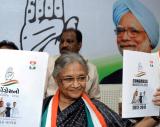 New Delhi, Feb 23: Political parties can no longer make tall promises on freebies in their election manifestos as they will now have to explain the rationale of their pledges and ways and means of meeting the financial requirements.
New Delhi, Feb 23: Political parties can no longer make tall promises on freebies in their election manifestos as they will now have to explain the rationale of their pledges and ways and means of meeting the financial requirements.
This follows an Election Commission move to create a level-playing field before elections following directions from the Supreme Court.
In fresh guidelines to political parties on poll manifestos, the Election Commission has asked them not to make such promises that disturb the level-playing field and vitiate the atmosphere or exert undue influence on voters.
"Trust of voters should be sought only on those promises which are possible to be fulfilled," the Commission said.
The Supreme Court had noted in its July 5, 2013 verdict that though promises in election manifesto cannot be construed as a corrupt practice as per law, the distribution of freebies of any kind "influences" all people.
"It shakes the root of free and fair elections to a large degree," the SC held, asking the poll body to ensure level playing field between contesting parties and candidates in elections and see that purity of election process does not get vitiated.
While issuing the guidelines after incorporating views of political parties during their meeting with them on February 7, the poll body included them in the Model Code of Conduct.
The poll body said the manifesto shall not contain anything repugnant to the ideals and principles enshrined in the Constitution and that it shall be consistent with the letter and spirit of other provisions of the Model Code.
EC said Directive Principles of state policy enshrined in Constitution enjoin upon the state to frame various welfare measures for citizens and therefore there can be no objection to the promise of such welfare measures in manifestos.
"However, political parties should avoid making those promises which are likely to vitiate the purity of the election process or exert undue influence on the voters in exercising their franchise," the Commission held.
EC had earlier circulated draft guidelines in this regard and elicited the views of parties on the issue.
Parties, during their meeting with EC, had expressed divergent views and most of them were against issue of such guidelines saying making promises to the electorate was their right.






Comments
Add new comment